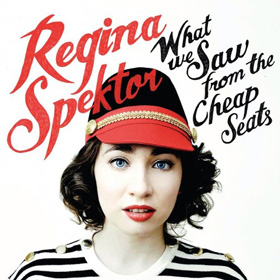What We Saw From the Cheap Seats by Regina Spektor

4/5
Regina Spektor often scratches itches you didn’t know you had. Her vocal acrobatics and creative resonance are exclusive to her alone, and the distinctive notes of her talent are recognized upon the striking of the first chord, the first note even, the first crisp pitch—her new album, What We Saw from the Cheap Seats, is no exception to this rule.
Since Spektor burst onto the air waves with her third studio recording Soviet Kitsch, people have been talking. For those unfamiliar with her, think Fiona Apple’s little sister, entwining similar narrative style lyrics with a touch more wit and bizarre burlesque pop thrown in for good measure. In fact, Spektor’s producer, Mike Elizondo, also produced Fiona Apple’s Extraordinary Machine. Like that album, the sounds of What We Saw from the Cheap Seats express maturation. The notes are more rounded, the themes more disciplined. A bit of a chameleon, Spektor is continuing her metamorphosis, one that began with Begin to Hope, as she relies less and less on vocal experimentation to carry her. Her main intent is to create an individual sound for each song. She creates vignettes instead of an overall “Regina Spektor” sound, approaching her album in the guise of a short story writer as opposed to a novelist.
For anyone familiar with her work, the second track on the album, “Oh Marcello,” will be like walking home. It’s electric and peculiar with her signature choppy vocal inflections, beat-box rhythms, playfully accented lyrics, and even ethereal melodies. Regina has that relentless knack for creating an improvisational feel to her music, staying clear of fussy, overworked material that can suck the soul out of any bit.
“Don’t Leave Me (Ne Me Quitte Pas)” is her second single, and comes as a standout example of her pop experimentation. Its cheeriness is a bit lacking—perhaps a song I’d catch drifting out from under a child’s doorframe. Mainly this is due to its repetitiveness, which isn’t uncharacteristic in a Spektor song, but this particular example is much too formulaic to denote lasting interest. It draws vague comparison to “Fidelity” (from Begin to Hope) in the verses, and some may even remember it as being originally released on Songs, as it’s actually a revamped version—the original a simplistic rendition featuring just Spektor’s vocals and piano. She chose to omit the breathy and slow reiteration of the title at the very end though—a bit of disappointment.
But, that is also what characterizes Spektor as a singer/songwriter—reinvention of not just her music and ideas, but traditions. The foundation of her sound is built upon the classical piano she was trained on, as well as Russian bards, jazz and even the spoken word sounds of musicians such as Ani DiFranco. Born in Russia and raised in the Bronx, Spektor pulls inspiration from all her surroundings with a hope, not to mimic, but to learn from the experimentations of others, to morph their talents into her own. “It’s like being little thieves,” she told Missbehave magazine, “putting out feelers.” “Every time you watch a movie or look at people have a conversation—you’re just stealing little specimens to use later.”
“Firewood” dabbles with a bit of a Norah Jones aesthetic—drawling notes serve as a backdrop to mellow, breathy words; “How” seems to draw influence from ‘90’s pop-ballads; “Jessica” is a gentle, acoustic hum; and “Open” brings in her unorthodox vocal experimentation, issuing an exaggerated guttural, throaty breath between lines. Undeniably, some may deem these particular quirks pretentious, maybe irritating, but it’s this precise notion that Spektor boldly sidles out on some thin limb without regard to whether it may break or spring her higher which so captivates and gratifies the listener.
“All The Rowboats” is the underscore to that view. As her first single it’s a bit of an empty tease—it’s surely the apex of the album—but the craggy, snow capped peaks it introduces in turn cause the other tracks to appear as mere grassland. It’s a bold, synthesized, ominous melody that carries more lyrical weight than its counterparts. Equally haunting and brusque, it dances around the keys with a heavy foreboding and perspicacity. The lines create a forlorn, nearly visual, atmosphere that weaves its way amongst the dark percussive beats: “But the most special are the most lonely / They will hang there in their gold frames / for forever, forever and a day / all the rowboats in the oil paintings/they keep trying to row away.” This is followed by “Ballad of a Politician,” equally striking with looming vibrations and laments. I hope the style hinted at in these two pieces will be developed further in the future.
The thing with Regina is, you get her or you don’t. She’s a genuine musician, a creative entity who serves to impress no one but the very notes she hums or buzzes, the keys she slaps or gently presses into submission. It’s the journey of her music that counts—luckily the results always seem to carry us, morphing and moving, right along with whatever dithering tide it seems she follows.
Release Date: May 29, 2012
Label: Sire Records
Stars: 4 out of 5
RELATED ARTICLES
Get the most-revealing celebrity conversations with the uInterview podcast!





Leave a comment